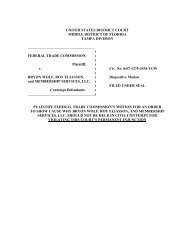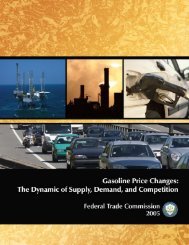Complaint Counsel's Post Trial Brief - Federal Trade Commission
Complaint Counsel's Post Trial Brief - Federal Trade Commission
Complaint Counsel's Post Trial Brief - Federal Trade Commission
Create successful ePaper yourself
Turn your PDF publications into a flip-book with our unique Google optimized e-Paper software.
472. LaMont does not know whether BioMixx is effective in the prevention, treatment, or cure<br />
of cancer. (LaMont, Tr. 580-81).<br />
II. COMPLAINT COUNSEL'S PROPOSED CONCLUSIONS OF LAW<br />
1. The acts and practices charged in the <strong>Complaint</strong> in this matter took place in or affecting<br />
commerce within the meanng of<br />
the <strong>Federal</strong> <strong>Trade</strong> Commssion Act, as amended.<br />
Nationwide adverising, marketing, or sales activity ofthe sort that Respondents engaged<br />
in constitutes "commerce" under the FTC Act. See, e.g., P.F. Coller & Son Corp. v.<br />
FTC, 427 F.2d 261, 272 (6th Cir. 1970); see, e.g., Ford Motor Co. v. FTC, 120 F.2d 175,<br />
183 (6th Cir. 1941) (noting that commerce also includes the actions, communcations,<br />
and other acts or practices that are incident to those activities).<br />
2. The Complait charges Respondents with violating Sections 5 and 12 of the FTC Act.<br />
The Commssion has jursdiction over the subject matter of this proceeding pursuant to<br />
those sections ofthe FTC Act. Section 5(a) provides that ''ufai or deceptive acts or<br />
practices in or affecting commerce are hereby declared unawfuL." 15 U.S.C. § 45(a)(1).<br />
The FTC is "empowered and directed" to prevent unfai or deceptive practices in<br />
commerce by "persons, parnerships, or corporations." 15 U.S.C. § 45(a)(2).<br />
3. The Commssion has jursdiction over persons, parerships, and corporations. 15 U .S.C.<br />
§ 45(a)(2). "Corporations" are defied in Section 4 of the FTC Act as "any company. .<br />
.which is organzed to car on business for its own profit or that of<br />
its members." 15<br />
U.S.C. § 44. Therefore, the <strong>Commission</strong> has jursdiction over Respondent DCO and<br />
Respondent James Feijo.<br />
4. Section 12 prohibits the dissemation of "any false adversement" in order to induce the<br />
purchase of "food, drgs, devices, or cosmetics." 15 U.S.C. § 52(a)(2). For the puroses<br />
of Section 12, the DCO Products are "food" or "drgs." 15 U.S.C. § 55(a), (b), (c)<br />
(defig "food" as, among other thngs, "aricles used for food or drink for man," and<br />
defig "drug" as, among other thgs, "aricles intended for use in the diagnosis, cure,<br />
mitigation, treatment, or prevention of disease in man"). Section 12 defines "false<br />
adverisement" as "an adverisement, other than labeling, which is misleading in a<br />
materal respect." 15 U.S.C. § 55.<br />
5. Respondents' speech is not protected by the First Amendment because it is deceptive<br />
commercial speech. The U.S. Supreme Cour has held that when the content of<br />
commercial speech is false or misleading, it can be suppressed. "There can be no<br />
constitutional objection to the suppression of commercial messages that do not accurately<br />
inform the public about lawful activity. The goverent may ban forms of.<br />
communcation more likely to deceive the public than to inform it." Central Hudson Gas<br />
& Elec. Corp. v. Public Service <strong>Commission</strong> of New York, 447 U.S. 557, 563, 100 S.Ct.<br />
2343,2350 (1980) (citing Friedman v. Rogers, 440 U.S. 1,99 S.Ct. 887 (1979)).<br />
Accordingly, "(t)he more limited protection accorded commercial speech perits the<br />
FTC to act when necessar to challenge false or deceptive advertising." In re Reynolds,<br />
40

















